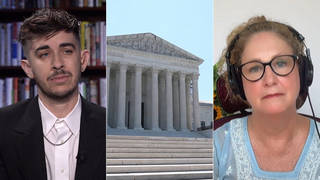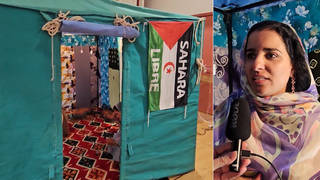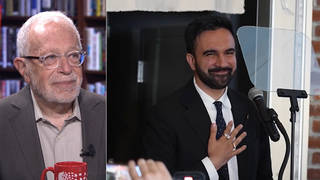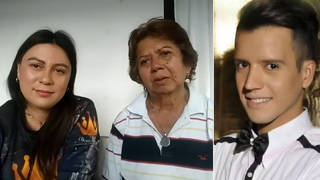
We speak with award-winning radio producer Dave Isay, the creator of StoryCorps, the audio-recording project which has just begun a six-month, 10-city national tour, and has completed about 5,000 interviews. We begin with a look at the story of Danny and Annie Perasa, the couple the StoryCorps booth in Grand Central Terminal was dedicated to earlier this month. [includes rush transcript]
A funeral is being held today in Brooklyn for longtime New York resident Danny Perasa. He died in his sleep on February 24th after being diagnosed last month with terminal pancreatic cancer. While many Americans may not have heard of Danny, his story remains preserved forever — in sound.
Two years ago, Danny and his wife, Annie, entered a StoryCorps recording booth in New York City’s Grand Central Terminal to record the remarkable story of their first date. They have returned numerous times since, to document events in their lives.
StoryCorps is a national project to instruct and inspire ordinary people to record each other’s stories in sound. The project, which has just begun a six-month, 10-city national tour, has completed about 5,000 interviews. It has the potential to become one of the largest documentary oral history projects ever donated to the Library of Congress.
- Dave Isay, award-winning radio producer and creator of StoryCorps.
Transcript
AMY GOODMAN: Award-winning radio producer Dave Isay who joined us in our firehouse studio yesterday.
DAVE ISAY: StoryCorps is a project that started about two-and-a-half years ago in Grand Central Terminal, and it’s a very simple idea. We built a booth in Grand Central, and you bring anyone you want to the booth — your grandmother, a friend, the person who brings you eggs in the morning at the diner every day, anyone who you want to get to know. And you’re met at the time booth by someone who’s called a facilitator, someone who works for us. And for a few minutes, a facilitator talks to you about how to do an oral history and then brings you inside the booth and closes the door.
And we have designed it as a sort of sacred space, so it’s very dark and perfectly quiet in the middle of Grand Central Terminal. And you sit across from your grandmother. The facilitator is sitting in the corner. And for 40 minutes you talk about anything you want to talk about. But most people talk about the big kind of life questions, like: How do you want to be remembered? What are the most important moments of your life? What did you sing to me when I was a kid? At the end of the 40 minutes, two CDs have been burned. And one goes home with you, and another one goes to the American Folklife Center at the Library of Congress to become part of an oral history of America.
AMY GOODMAN: How did you come up with this idea?
DAVE ISAY: Well, I’ve been doing radio for about 20 years now. And the person sitting across from me gave me my start all those many years ago.
AMY GOODMAN: I remember it well, the day you walked in and said we need to do a piece on a drug paraphernalia museum on the Lower East Side. You came to WBAI, and I said, “Well, why don’t you do it, sir?”
DAVE ISAY: Yep, and that was it.
AMY GOODMAN: And young you—
DAVE ISAY: Yep.
AMY GOODMAN: — went out with a tape recorder.
DAVE ISAY: But I have been doing — and you taught me so much in those early years. And I have been doing radio documentaries for a long time now. I did a documentary about 13, 14 years ago with two kids growing up in a housing project in Chicago called the Ida B. Wells Projects, where I gave them tape recorders and had them do a diary of their lives. And I saw that when these kids took these tape recorders and interviewed, say, their grandparents, that having a microphone and laying in bed with their grandmother and asking her these questions allowed these kids to ask questions they wouldn’t normally get to ask and created bonds that existed long after the tape recorder got turned off. And then when these relatives passed away, these tapes became enormously important to these young men. So that was really the beginning of StoryCorps.
And over the years there were a bunch of other projects that just made me kind of think that all of the whole country should have access to a project like this and should be able to have these kind of conversations. I mean, you love radio. I love radio. There’s such an intimacy in the voice and just being in a quiet place and getting to ask people questions you don’t normally get to ask. And, you know, the idea of StoryCorps is that all of our stories matter and that everybody should be treated with dignity, and everyone’s story should be preserved in a thoughtful and dignified manner. And that’s what the project is about.
AMY GOODMAN: Well, let’s go to the audiotape, the first example of voices from StoryCorps.
DAVE ISAY: Sure. Sure. The first clip we have is a clip that was recorded very early at our Grand Central booth. And this a couple — his name is Danny Perasa, and he was an OTB clerk here in New York City, and his wife’s name is Annie. And they came to the booth just about at the beginning of 2004, and they wanted to tell the story of their very first date. So this is Danny and Annie Perasa.
DANNY PERASA: She started to talk. And I said, “Listen, I’m going to deliver a speech.” I said, “At the end, you’re going to want to go home.” I said, “You represent a dirty four-letter word, and that word is 'love.'” I says, “If we’re going anywhere, we’re going down the aisle, because I’m too tired, too sick and too sore to do any other damned thing.” And she turned around, and she said, “Of course, I’ll marry you.” Then, the next morning I called her as early as I possibly could.
ANNIE PERASA: And he always gets up early.
DANNY PERASA: To make sure that she hadn’t changed her mind. And she hadn’t. And every year on April 22, around 3 o’clock, I call her and ask her if it was today, would she do it again. And so far, the answer has been the same.
ANNIE PERASA: Yeah, 25 times. Yes.
DANNY PERASA: You see, the thing of it is, I always feel guilty when I say “I love you” to you, and I say it so often. I say it to remind you that, as dumpy as I am, it’s coming from here. It’s like hearing a beautiful song from a busted old radio, and it’s nice of you to keep the radio around the house.
ANNIE PERASA: If I don’t have a note on the kitchen table, I think there’s something wrong. You write a love letter to me every morning.
DANNY PERASA: Well, the only thing that could possibly be wrong is I couldn’t find a silly pen.
ANNIE PERASA: “To my princess, the weather out today is extremely rainy. I’ll call you at 11:20 in the morning.”
DANNY PERASA: It’s a romantic weather report.
ANNIE PERASA: “And I love you. I love you. I love you.”
DANNY PERASA: When a guy is happily married, no matter what happens at work, no matter what happens in the rest of the day, there’s a shelter when you get home. There’s a knowledge, knowing that you can hug somebody without them throwing you down the stairs, saying “Get your hands off me!” And being married is like having a color television set. You never want to go back to black-and-white.
AMY GOODMAN: So that was Danny and Annie Perasa, the beginning of 2004?
DAVE ISAY: Yeah. And, you know, I think Danny and Annie represent — say a lot about what this project is about to me, the idea that our stories, the stories of everyday people, are just as interesting and important as the stories of Martha Stewart and Donald Trump and all this nonsense that we’re fed from every place all the time. Danny — actually, Danny and Annie, over time, became kind of the matriarch and patriarch of the project. Danny came back to the booth many, many times. He came back with Annie to talk about their love. He brought all kinds of characters from his life into the booth to interview them — a Major League umpire and an undercover cop, and all sorts of people — and they fell in love with StoryCorps, and we fell in love with them.
And eventually we started traveling the country with them, talking about StoryCorps. And sadly, in January Danny was diagnosed with a fast-spreading cancer. And on February 10, we dedicated our Grand Central booth to Danny and Annie. And then on February 17, Danny, whose cancer was spreading very, very quickly, asked us to come to his house to record one final interview with him and Annie. So I brought that with me. This is Danny and Annie Perasa on February 17th in their house in Bay Ridge, Brooklyn.
ANNIE PERASA: The illness is not hard on me. It’s just, you know, the finality of it. And him, he goes along like a trooper.
DANNY PERASA: Listen, even downhill a car doesn’t roll unless it’s pushed. You’re giving me a great push. The deal of it is, we try to give each other hope, and not hope that I’ll live, hope that you’ll do well after I pass, hope that people will support her, hope that if she meets somebody and likes him, she marries him.
ANNIE PERASA: Yeah, he has everything planned.
DANNY PERASA: I’m working on her. She said that — it was her call — she wants to walk out behind the casket alone. I guess that’s the way to do it, because when we were married, you know how your brother takes you down, your father takes you down? She said, “Well, I don’t know which of my brothers to walk in with. I don’t want to offend anybody.” I says, “I got a solution.” I said, “You walk in with me. You walk out with me.” And the other day, I said, “Who’s going to walk down the aisle with you behind the casket?” You know, to support her. And she said, “Nobody. I walked in with you alone. I’m walking out with you alone.”
There’s a thing in life, where you have to come to terms with dying. Well, I haven’t come to terms with dying yet. I want to come to terms with being sure that you understand that my love for you up to this point was as much here as it could be and as much as it could be for eternity. I always said the only thing I have to give you is a poor gift and it’s myself. And I always gave it. And if there’s a way to come back and give it, I’ll do that, too. Do you have the Valentine’s Day letter there?
ANNIE PERASA: Yes. “My dearest wife. This is a very special day. It is a day on which we share our love, which still grows after all these years. Now, that love is being used by us to sustain us through these hard times. All my love, all my days, and more. Happy Valentine’s Day.”
DANNY PERASA: I could write on and on about her. She lights up the room in the morning when she tells me to put both hands on her shoulders so she can support me. She lights up my life when she says to me at night, “Wouldn’t you like a little ice cream?” or “Would you please drink more water?” I mean, those aren’t very romantic things to say, but they stir my heart. In my mind, in my heart, there has never been, there is not now, and never will be, another Annie.
AMY GOODMAN: Danny and Annie Perasa.
DAVE ISAY: Danny passed away one week after he made this recording. And, you know, I think that, as I said before, they really personify so much of what StoryCorps is about. Our motto is “Listening is an act of love.” And you can hear in every word in that interview the love between Danny and Annie. And, you know, that’s what StoryCorps is about. You know, other people who are watching on the TV show can see pictures of Danny, and he was, you know, he was a short gnome of a guy, missing a lot of teeth, bald. And when you walk down the street, you wouldn’t necessarily notice the guy.
But StoryCorps is about taking the time to really listen to the people who you wouldn’t necessarily notice walking down the street. And when you do listen, you see the poetry and grace that, you know, is in all of us. And I think StoryCorps also is about recognizing how much we all share in common. You know, we spend so much time in this country kind of shouting at each other. And StoryCorps is an opportunity to listen to each other and recognize that there’s so much more that we share in common than divides us. And hopefully this is a project which will help us become a more compassionate and thoughtful nation, which is something we need.
AMY GOODMAN: Award-winning radio producer, David Isay. He is the founder of StoryCorps. Danny Perasa is being buried today. His funeral is at the Visitation Monastery, a nunnery in Bay Ridge, Brooklyn, where his wife Annie is a volunteer nurse.













Media Options